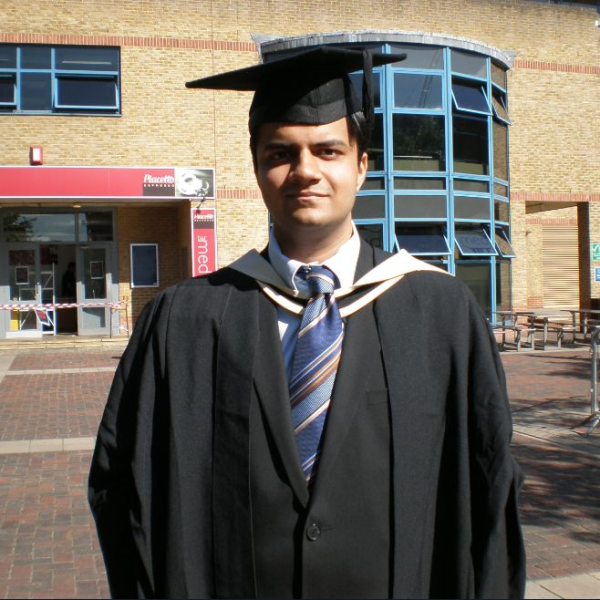Alumni profile - Avenesh Mahtani
(Business Management BSc with German, 2010)
Knowing that many large multinationals were German, studying German gave me a better insight into their organisational cultures, which allowed me to better understand business from an Anglo-Germanic perspective.

Why did you choose to study Business Management at Queen Mary?
I did really well in my Business Studies A-Levels at high school and wanted to continue furthering my knowledge in that field. The University of London had a great reputation which made it easy for me to choose to study at Queen Mary, which was a multiculturally diverse environment, which reflected my own personality and desires perfectly.
What did you enjoy most about your degree?
I enjoyed the broad variety of topics that were covered, while getting to know so many interesting and diverse students on the course. The Mile End campus provided both a fun and productive work environment, which made the 3 years of studying enjoyable.
In your third year, you chose to study some German modules in the School of Languages, Linguistics and Film. How did you come to this decision and what was your experience of studying language modules like?
I wanted to experience studying in another school at Queen Mary and thought that the language school would be ideal, as I had already completed an A-Level in German at high school and knew that language skills were very compatible and useful in a business environment.
Not only do languages provide people with more options for travelling, they also allow us to learn about different cultures, while allowing for successful integration and assimilation in diverse environments. Languages are key to building trust and relationships, while breaking down cultural barriers.
What was it that interested you about the German language in particular?
Having completed an A-Level in German, I looked forward to keeping in touch with the German language and felt this was an ideal way to further develop my vocabulary in this field, in both an academic and business context.
What was the balance of your business and language modules like and how did they complement each other?
In my 3rd year, I did 6 business modules and 2 German modules. I really enjoyed studying at two different schools, as this allowed me to meet more students and professors. Interestingly, certain academic topics such as history, economics, and politics, overlapped in both schools and this allowed me to gain different insights into those subjects, which broadened my knowledge on the subject matter.
What surprised you most about studying languages and what are some of the most interesting things you learned?
Studying languages provided me with a great insight into different topics like philosophy, which had not been covered in depth during my business degree. The fact that the German faculty were themselves native speakers provided insights into another culture and way of working. Knowing that many large multinationals were German, studying German gave me a better insight into their organisational cultures, which allowed me to better understand business from an Anglo-Germanic perspective.
Can you tell us about your career to date and what you do now?
Having graduated with 1st Class Honours amidst a global recession in 2010, the job market was a very volatile environment. I struggled to find employment in a conventional business environment and decided to pursue teaching as an avenue. I trained to teach English as a foreign language and learnt that there was a great demand in Europe for native English speakers to teach English and Business English.
Having just completed my degree in Business, I moved to Germany and found employment within a month of arriving. I worked at a language school and taught English to non-native speaking adults. Due to my business degree, I also coached job-seeking individuals and taught Business English in companies.
My Business English lessons ranged from business correspondence to teaching terminology in finance, HR and marketing, a feat only achievable due to the good grounding provided in my degree. Having worked in adult education for 6 years, I then spent a short time in logistics before moving into a teaching position at a trilingual primary school.
How has your Business Management degree benefited your career?
During my days in adult education, I was able to make full use of my business degree. Not only by teaching business terminology to my students, but also by working with my students on large international projects. This provided me with an insight into real working life in multiple industries including finance, marketing, and HR, while putting my theoretical knowledge as an outside advisor and academic into practice.
Are there any ways in which you still explore your passion for languages today?
I have been working at a trilingual primary school in Germany for the last 5 years. Our languages are English, German and Spanish and all 3 languages are spoken throughout the school. Correspondence and meetings take place in these languages and working in this environment has helped me improve my German and inspired me to start learning Spanish. I teach English to non-native speakers, not only in English lessons, but also in maths, geography and ethics. This allows children to broaden their knowledge of the language quickly. Multilingualism is a fascinating notion and provides individuals with a competitive edge, both in an academic and occupational context.
In your opinion, why should more people study languages at university?
Not only do languages provide people with more options for travelling, they also allow us to learn about different cultures, while allowing for successful integration and assimilation in diverse environments. Languages are key to building trust and relationships, while breaking down cultural barriers.
- Find out more about studying Business Management at Queen Mary
- Find out more about studying Languages at Queen Mary
If you would like to get in touch with Avenesh or engage them in your work, please contact the Alumni Engagement team at alumni@qmul.ac.uk.